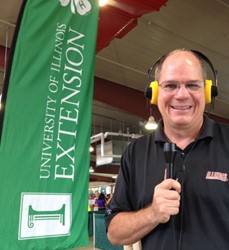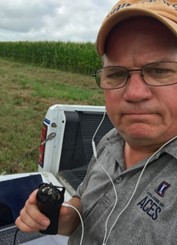 WILL Radio has been one of a kind since 1922 as one of the country’s first radio stations on the air.
WILL Radio has been one of a kind since 1922 as one of the country’s first radio stations on the air.
A licensee of the University of Illinois, WILL is located on campus, although the university has no direct involvement. The station includes WILL Radio, Television and WILL Online.
The first broadcast WILL produced included an extension program called “Turning Cream into Gold.” It was part of the dairy cattle extension outreach program in 1922. In 1936, WILL Radio began broadcasting the market numbers from the Chicago Board of Trade; it was one of the very first stations to broadcast market numbers.
“There’s a lot of history with [WILL] and because it’s licensed with the University of Illinois and it’s located on campus, it has always been a leader within radio and technology,” Todd Gleason, the first WILL farm reporter and a current WILL program host, explained.
WILL Radio has a long history of student workers, many of which found a passion for broadcasting.
“In the fall of 1985, I came onto WILL as a student employee and went on the air for the first time in November,” Gleason noted.
While Gleason was a student employee, agricultural programming was being developed. That programming provided the building blocks for current agricultural services.
“The programming was formulated in such a way that it was supposed to not interfere with commercial farm broadcasters. It was a complementary service that wanted to cover markets, weather and national policy in a way that gave greater context and most local broadcasters would not be doing,” Gleason said.
Being on the air at least once a year since 1985, Gleason was hired as the first farm market reporter just four years later in 1989.
 Gleason also wrote the WILL mission statement that is still in use today: “To inform and engage people in Illinois through high-quality journalism.”
Gleason also wrote the WILL mission statement that is still in use today: “To inform and engage people in Illinois through high-quality journalism.”
“The content was really designed to complement what was happening on local stations and to use resources on campus,” Gleason added.
“Producers are not near as comfortable in marketing their crops,” Gleason said. “It is a difficult prospect and producers are always on the hunt for news and information, whether it’s happening on the markets, weather, or every other thing that happens.”
Gleason now works for the Illinois Extension Service. He currently hosts a daily program called “The Closing Market Report” and a weekly program called “Commodity Week” which both air on WILL Radio.
